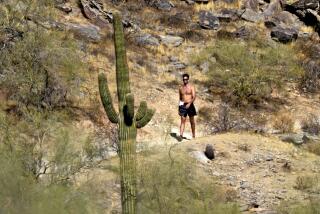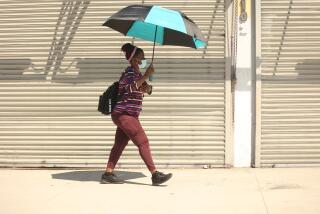On Some Jobs, Misery Rises With Mercury
So you think it’s hot?
Just be glad you don’t have to work all day on a tar roof, lifting heavy materials dozens of feet above the ground with absolutely no shade in sight.
In an informal survey of the “hottest” jobs in the sweltering summer heat, roofers topped the list, followed by other construction workers, dry-cleaning employees--and Mickey Mouse.
“Anyone who wears a costume--like Disneyland characters--classically loses five pounds of water or more in one shift,” said Fred Dennis, a physician in Cedars-Sinai Medical Center’s emergency room. “When you’re in a closed costume, you lose your ability to sweat or lose heat by sweating, and that’s when your temperature starts to go up.”
Mickey and his buddies take frequent breaks and greet visitors in the shade or in air-conditioned rooms, Disneyland spokesman Jim McClintock said.
“The No. 1 reason why people come to Disneyland is to meet Mickey Mouse,” McClintock said. “Visitors are guaranteed to meet Mickey, even on a hot day.”
Painters have it tough, too. Craig Henderson, owner of Craig Henderson Custom Painting in Rancho Santa Margarita, was sweating it out painting cabinets outdoors in San Clemente on Wednesday morning.
“It’s pretty darn hot,” he said. “We brought a whole jug of water, and it’s almost gone. It was supposed to last us the whole day. We’re a pretty tough group. I think we get more work done when it’s hot because the paint dries faster.”
*
Roofers, however, are closer to the sun, said Dennis Chan, an emergency room physician at County USC Medical Center who regularly treats patients for heatstroke. “They’re usually working with dark materials that absorb a lot of heat.”
Because it takes time and effort to get on and off the roof, “they tend to sit up there for a long time instead of taking frequent breaks,” Chan said.
While there is no official list of jobs that are particularly brutal in the summer heat, there are identifiable risk factors, said Carol Peterson, a medical epidemiologist with the Los Angeles County Public Health Department. They include working in closed spaces with poor ventilation and no air conditioning and performing a fair amount of physical activity, she said.
State and local government employees--including firefighters and highway workers--reported the most instances of on-the-job heat-related injuries in 1991, the latest year for which statistics are available, said John Duncan, a spokesman for the California Department of Industrial Relations.
Government employees accounted for nearly a third of the reported injuries, followed by construction workers at 19%, farm workers at 13% and service industry workers at 13%, Duncan said. Service industry workers include people working at theme parks, fast-food restaurants and gas stations.
Construction workers such as roofers are prone to bouts of heat exhaustion and heatstroke, which cause high temperatures, nausea, dizziness, headaches, muscle cramps and seizures, said Christine Hayne, director of the emergency department at Queen of Angels Hollywood Presbyterian Medical Center.
“Virtually anyone who works outside can get it,” said Catherine Montagna, a spokeswoman for California Medical Center in Los Angeles. “That includes road construction workers, linemen for the telephone or electric company, field laborers and police and firemen.”
There’s no escape from the heat at Bowers & Sons Cleaners in Los Angeles, where workers operate pressing machines for six hours a day in a back room without air conditioning, employee Nick Carter said.
“It has to be over 100 degrees in there,” Carter said. “We’ve got three fans going and we keep the doors open. I don’t think air conditioning would make any difference.”
As for the fate of the sun-prone roofers, don’t worry about them. They get used to it, said roofer Ron Gregory, owner of Star Roofing Co. in Los Angeles. Roofers become acclimated to the heat and drink plenty of fluids, he said. It helps to work in the early morning and late evening and take the hot afternoons off, Gregory said.
*
Times staff writer Dean Takahashi contributed to this report.
More to Read
Sign up for Essential California
The most important California stories and recommendations in your inbox every morning.
You may occasionally receive promotional content from the Los Angeles Times.











